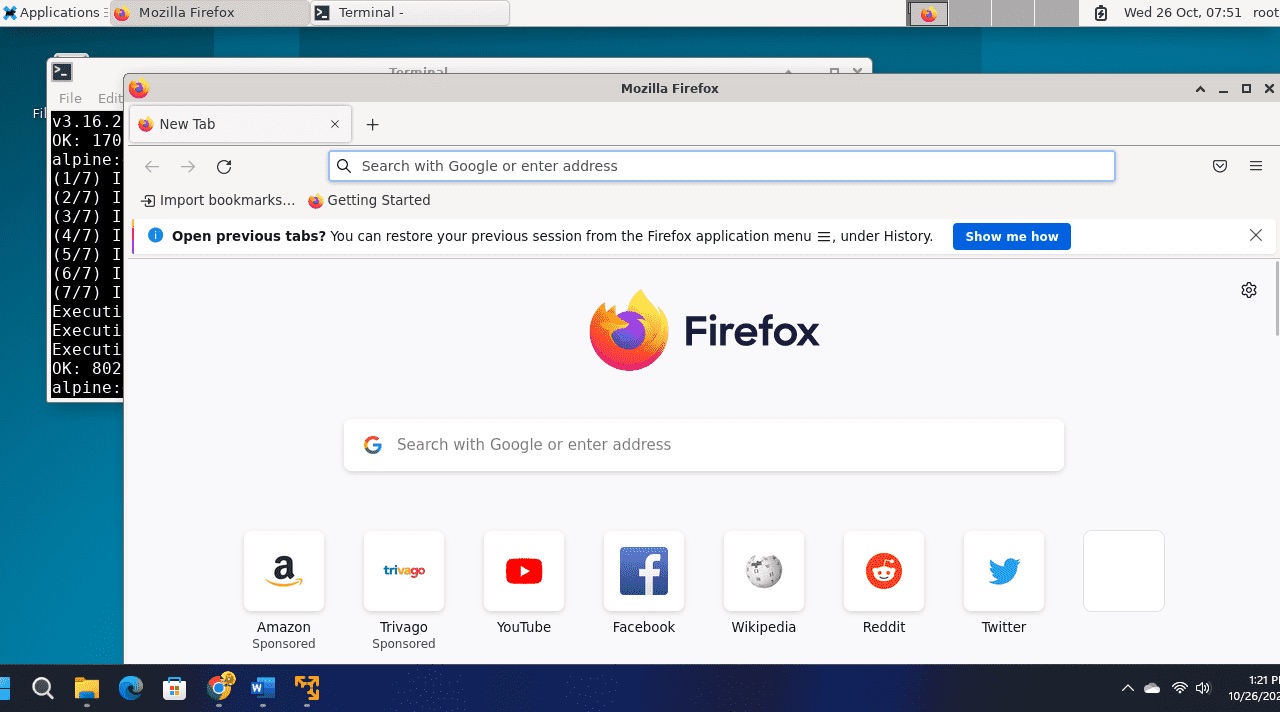Introduction
The inception of Firefox marked a pivotal moment in the history of web browsing. As one of the most popular and widely used web browsers, Firefox has played a significant role in shaping the digital landscape. Its journey from a humble beginning to a powerhouse in the browser market is a testament to its enduring impact and innovation.
Firefox, developed by Mozilla Corporation, emerged as a beacon of open-source browsing, championing user privacy and customization. Its introduction brought forth a new era of web exploration, empowering users with a feature-rich and secure browsing experience. With a commitment to transparency and user empowerment, Firefox quickly garnered a loyal following, setting the stage for its remarkable evolution.
The story of Firefox is not just about a browser; it's a testament to the spirit of innovation and community collaboration. From its early days, Firefox has been fueled by a passionate community of developers, enthusiasts, and users who have contributed to its growth and success. This collaborative ethos has been instrumental in shaping Firefox into the versatile and user-centric browser it is today.
As we delve into the birth and evolution of Firefox, we uncover the driving forces behind its creation, the milestones that have defined its journey, and the profound impact it has had on the browser market. Join us on this exploration of Firefox's remarkable trajectory, from its humble beginnings to its status as a trailblazer in the world of web browsing.
The Birth of Firefox
In the early 2000s, the dominance of Internet Explorer in the web browser market was palpable. Users were limited in their browsing experience, and the lack of innovation led to a stagnant landscape. It was during this time that a group of visionary developers at Mozilla Corporation set out to challenge the status quo and redefine the browsing experience. This ambitious endeavor laid the groundwork for the birth of Firefox.
The journey of Firefox can be traced back to the Netscape browser, which was the pioneer in the early days of the internet. As Netscape's popularity waned, the Mozilla community, driven by a fervent desire to create a better browsing alternative, embarked on the ambitious Mozilla project. This initiative aimed to develop an open-source browser that prioritized user empowerment and innovation.
Amidst this backdrop, the Mozilla team, comprising dedicated developers and volunteers, embarked on the monumental task of crafting a browser that would embody the principles of openness, security, and user-centric design. This collaborative effort culminated in the release of Firefox 1.0 on November 9, 2004, marking a significant milestone in the history of web browsing.
The birth of Firefox heralded a new era of browsing, characterized by a focus on user privacy, customization, and performance. Its innovative features, such as tabbed browsing, pop-up blocking, and a robust extension ecosystem, set it apart from its competitors. Moreover, Firefox's commitment to open standards and community-driven development resonated with users, fostering a sense of ownership and participation in the browser's evolution.
The release of Firefox ignited a wave of enthusiasm among users who sought a refreshing alternative to the prevailing browser landscape. Its emphasis on security and privacy reassured users, while its customizable interface and extensive add-on library empowered them to tailor their browsing experience to their preferences.
The birth of Firefox not only introduced a formidable competitor in the browser market but also symbolized a triumph of community-driven innovation. The collaborative spirit that fueled its creation laid the foundation for its future evolution, cementing its status as a trailblazer in the realm of web browsing.
As Firefox took its first steps into the digital world, it carried with it the aspirations of a community determined to redefine the browsing experience. Little did the world know that this humble beginning would pave the way for a transformative journey that continues to shape the way we navigate the web today.
The Evolution of Firefox
The evolution of Firefox stands as a testament to its unwavering commitment to innovation, user empowerment, and adaptability. Following its groundbreaking debut, Firefox embarked on a journey of continuous refinement and enhancement, solidifying its position as a pioneering force in the browser market.
With each iteration, Firefox underwent a series of transformative updates, introducing cutting-edge features and performance enhancements that resonated with users. The browser's evolution was characterized by a relentless pursuit of excellence, driven by user feedback, technological advancements, and the ever-changing demands of the digital landscape.
One of the defining aspects of Firefox's evolution was its emphasis on user privacy and security. As online threats and privacy concerns became increasingly prevalent, Firefox responded by integrating robust privacy features and advanced security protocols into its framework. This proactive approach not only safeguarded users' browsing activities but also instilled a sense of trust and confidence in the Firefox ecosystem.
Moreover, Firefox's evolution was marked by its unwavering dedication to open standards and interoperability. The browser consistently embraced emerging web technologies, ensuring seamless compatibility with evolving web standards and protocols. This commitment to interoperability empowered developers and users alike, fostering a cohesive and inclusive web experience.
The evolution of Firefox also witnessed the introduction of a diverse array of extensions and add-ons, further enriching the browsing experience. These extensions, developed by a vibrant community of contributors, expanded Firefox's functionality, allowing users to personalize their browsing environment and tailor it to their specific needs.
Furthermore, Firefox's evolution was characterized by its relentless pursuit of performance optimization. The browser underwent significant enhancements to improve speed, responsiveness, and resource efficiency, ensuring a smooth and fluid browsing experience for users across various platforms and devices.
As Firefox evolved, it continued to prioritize user-centric design, accessibility, and inclusivity. The browser's interface underwent iterative refinements, enhancing usability and ensuring a seamless experience for users of all backgrounds and abilities.
The evolution of Firefox represents a remarkable journey of adaptability, resilience, and unwavering dedication to user satisfaction. With each milestone, Firefox has reaffirmed its commitment to empowering users and pushing the boundaries of web browsing, setting a standard of excellence that continues to inspire the digital landscape.
In summary, the evolution of Firefox is a testament to its enduring pursuit of innovation, user-centric design, and unwavering commitment to excellence. As Firefox continues to evolve, it remains poised to shape the future of web browsing, embracing new challenges and opportunities with the same pioneering spirit that defined its inception.
Firefox's Impact on the Browser Market
Firefox's entry into the browser market sparked a seismic shift, challenging the longstanding dominance of Internet Explorer and reshaping the competitive landscape. The browser's impact reverberated across the digital realm, influencing user preferences, industry standards, and the trajectory of web browsing as a whole.
Upon its release, Firefox swiftly garnered attention for its innovative features, robust security measures, and commitment to user privacy. This resonated deeply with users who sought a browsing experience that prioritized their needs and preferences. As a result, Firefox emerged as a formidable contender, offering a compelling alternative to existing browsers and igniting a wave of user migration.
One of the most significant contributions of Firefox to the browser market was its role in fostering healthy competition and innovation. By introducing pioneering features such as tabbed browsing, pop-up blocking, and a vibrant extension ecosystem, Firefox set new benchmarks for user experience and functionality. This compelled other browsers to enhance their offerings, ultimately benefiting users through a wave of innovation and feature enrichment.
Furthermore, Firefox's emphasis on open standards and community-driven development set a precedent for transparency and collaboration within the browser market. The browser's open-source nature and the active involvement of a passionate community of developers and contributors underscored the power of collective innovation, inspiring a culture of collaboration and knowledge sharing within the industry.
Firefox's impact extended beyond technological advancements, influencing the broader narrative of user empowerment and privacy advocacy. As users gravitated towards Firefox's privacy-centric approach, it prompted other browsers to reevaluate their privacy policies and security measures, ultimately raising the bar for user protection across the industry.
Moreover, Firefox's market impact was underscored by its role in promoting web standards and interoperability. By championing open standards and embracing emerging web technologies, Firefox contributed to a more cohesive and inclusive web ecosystem, driving the adoption of standardized practices that benefited developers and users alike.
In essence, Firefox's impact on the browser market transcended mere market share dynamics; it catalyzed a paradigm shift in user expectations, industry practices, and collaborative innovation. Its influence continues to reverberate, shaping the trajectory of web browsing and reinforcing the significance of user-centric design, privacy advocacy, and community-driven development within the digital landscape.
As Firefox's impact persists, it serves as a testament to the transformative power of innovation, collaboration, and a steadfast commitment to user empowerment. The browser's legacy is indelibly woven into the fabric of the browser market, leaving an enduring imprint that continues to inspire and propel the evolution of web browsing.
Conclusion
In conclusion, the journey of Firefox from its inception to its current standing as a trailblazer in the browser market is a testament to the enduring impact of innovation, community collaboration, and user-centric design. The birth of Firefox marked a pivotal moment in the history of web browsing, challenging the status quo and ushering in a new era of user empowerment and privacy advocacy.
As Firefox evolved, it demonstrated an unwavering commitment to excellence, continuously refining its features, performance, and security measures to meet the evolving needs of users. The browser's emphasis on open standards, interoperability, and inclusivity further solidified its position as a pioneering force in the digital realm.
Firefox's impact on the browser market transcended market share dynamics, catalyzing a paradigm shift in user expectations, industry practices, and collaborative innovation. Its influence continues to reverberate, shaping the trajectory of web browsing and reinforcing the significance of user-centric design, privacy advocacy, and community-driven development within the digital landscape.
Looking ahead, Firefox remains poised to shape the future of web browsing, embracing new challenges and opportunities with the same pioneering spirit that defined its inception. As it continues to evolve, Firefox stands as a beacon of user empowerment, innovation, and community collaboration, inspiring the digital landscape and leaving an indelible imprint on the browser market.
In essence, the story of Firefox is not just about a browser; it's a testament to the spirit of innovation and community collaboration, a journey that continues to redefine the way we navigate the web and underscores the transformative power of collective ingenuity and user-centric design.

























